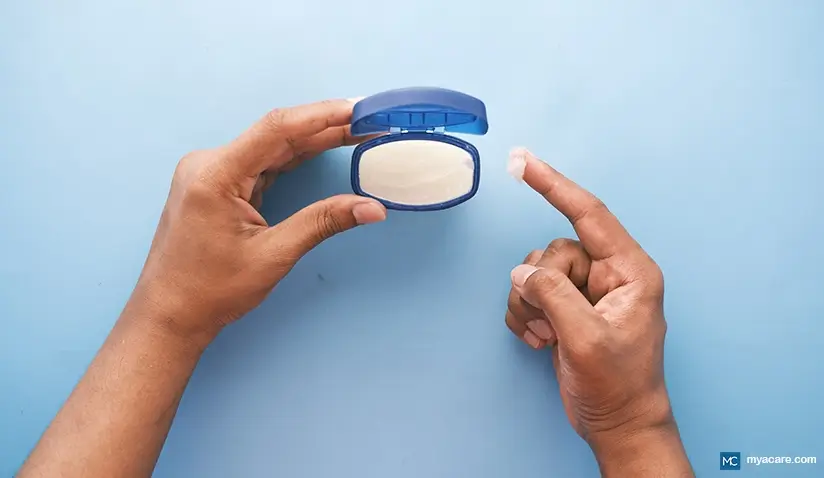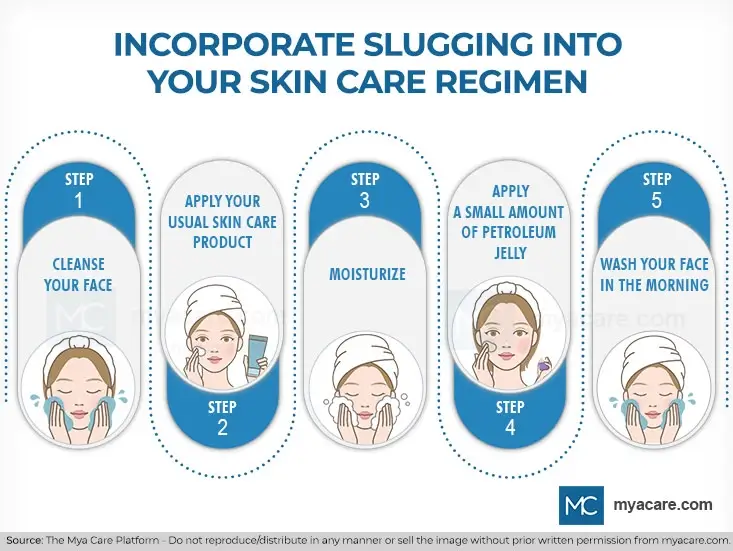Slugging With Petroleum Jelly: Does This Viral Skin Care Trick Work?

The skin is an integral part of the human body because it serves many functions. It forms a protective physical barrier between the body and its surroundings and shields the body from various sources of physical damage, which may be due to trauma, stress, chemicals, infection, temperature changes, or ultraviolet radiation.
When the skin loses or decreases its ability to repair damage, it may become dry and irritated and may look dull and irradiant. Moisturizers can be essential in keeping the skin smooth, soft, and well-hydrated.
There are various types of moisturizers, but this article will focus on one of the most common, inexpensive products found in almost every home – petroleum jelly.
What is Petroleum Jelly?
Petroleum jelly is an example of an occlusive type of moisturizer. Occlusives block transcutaneous water loss and seals water under the skin’s surface, preventing the skin from becoming dehydrated.
Petroleum jelly has many other uses. Aside from relieving dry skin, petroleum jelly can also be applied on dry lips, eyelids, and on cracked heels and hands. It can aid in the healing of small cuts and burns, prevent chafing when body parts rub against each other, treat diaper rash, and can help rehydrate nails. Petroleum jelly is also very useful in certain skin conditions like eczema and psoriasis because it helps repair and protect the skin barrier and keeps it moisturized.
What is Slugging?
Slugging has become a trend on social media. It refers to the application of a layer of petroleum jelly to “seal-in” skincare. In slugging, petroleum jelly is usually applied overnight and is the last step in the skin care regimen. It is applied to enhance the skin’s radiance and moisture.
Skin Benefits of Slugging
As an occlusive, petroleum jelly improves the skin barrier function, and minimizes the skin’s water loss, preventing it from being dry and dehydrated. It also serves as a protective barrier, which can help keep out any allergens that can irritate the skin. Lastly, applying petroleum jelly on damaged skin can aid in its repair.
In slugging, when petroleum jelly is applied after one’s nighttime skincare regimen, it helps “lock in” the other products applied. Petroleum jelly is non-comedogenic. This means that they are not likely to cause comedones (whiteheads and blackheads) or cause acne breakouts.
How Do I Incorporate Slugging into my Skin Care Regimen?
It is imperative that one still incorporates the basic steps of a skin care regimen when slugging. It may be done during the daytime or nighttime, but slugging after one’s nighttime skincare routine is more commonly practiced.
- Cleanse – slugging should be done on clean skin
- Apply skin care – apply the usual skin products you use, as advised by a dermatologist
- Moisturize
- Apply a small amount of petroleum jelly – you only need to put on a thin layer on the face. If the petroleum jelly layer is too thick, it may exacerbate the side effects of the other products in your skin care routine, such as irritation from retinoids.
- Wash your face in the morning.

Slugging Might Not Be Ideal For:
- Oily skin - Slugging may occasionally be done for those with oily skin, but it’s better to start off slow and to only place a small amount of petroleum jelly. Putting too much can occlude all the trapped sebum (oil) on the face, which can cause further skin problems such as acne.
- Acne-prone skin - It is not advisable for those with acne-prone skin to practice slugging. Petroleum jelly can occlude the bacteria and dead skin, which may cause an inflammatory response, leading to the appearance of more acne lesions.
- Infected skin – Petroleum jelly may be helpful in small cuts or burns, but it is not advisable for larger wounds, as it can prevent it from healing properly.
- Those using many active ingredients in their skincare regimen such as retinoids should be careful when sealing in the product with petroleum jelly. This can trap the ingredient and push it further into the skin, which can cause more absorption, and consequently, more irritation.
Take-Home Messages
Slugging has its benefits if incorporated properly into one’s skin care routine. It can help protect and moisturize the skin, and can also contribute to “glowing” and “bright” skin. However, those with oily, acne-prone skin, infected skin, and those who use many skin care products with active ingredients should be cautious when trying to integrate slugging into their regimen. It is recommended to consult with a dermatologist regarding one’s concerns when it comes to slugging with petroleum jelly in order to be properly guided and advised.
To search for the best health providers for dermatology in Croatia, Germany, Greece, Italy, Malaysia, Singapore, Slovakia Spain, Thailand, The UAE, the UK, and the US, please use our free search engine.
To search for the best healthcare providers worldwide, please use the Mya Care search engine.
Dr. Lauren Livelo is a board-certified dermatologist from the Philippines. She has a degree in Medicine from the University of the East Ramon Magsaysay Memorial Medical Center, and has completed her dermatology residency training in the Research Institute for Tropical Medicine. Aside from her private practice, she enjoys writing about skin care and diseases of the skin.
References:
Featured Blogs



